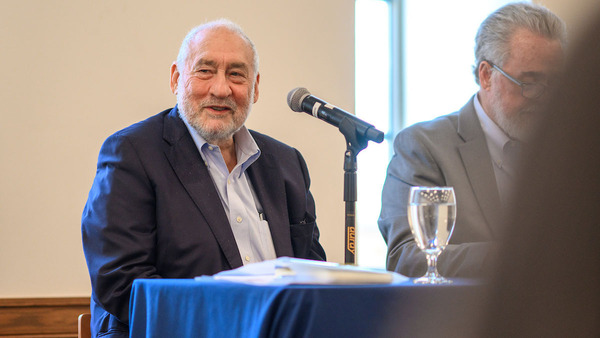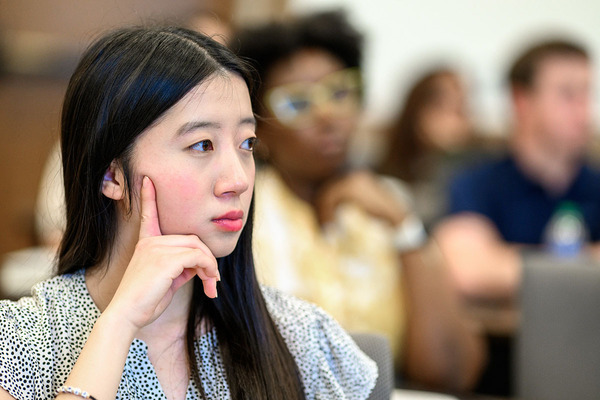Nobel laureate Joseph Stiglitz addresses inequality with a people-centered economy

Inequality is a policy choice — not an inevitable outcome — and can be addressed through economic approaches that prioritize human dignity, economist and Nobel laureate Joseph E. Stiglitz said during a recent visit to the University of Notre Dame’s Keough School of Global Affairs.
Stiglitz, a Columbia University professor and former chief economist at the World Bank, met with faculty and students as well as Keough School and Notre Dame leadership during his April 15 visit to campus, during which he delivered the inaugural Joseph E. Stiglitz Lecture on Inequality and the Good Society.
The new lecture series, made possible with support from the Ford Foundation, was organized by Ray Offenheiser, director of the Keough School’s McKenna Center for Human Development and Global Business. The series is dedicated to bringing outstanding scholars to Notre Dame to share groundbreaking scholarship and policy insights on inequality and is a part of larger strategic efforts by the school and the University to address global poverty.
Watch a discussion between Joseph Stiglitz and Ray Offenheiser on global inequality here.
Rules create structural inequality
During his public remarks, Stiglitz outlined the ways inequality is written into the rules of the U.S. and global economies by powerful interests that prioritize profit.
“Markets don’t exist in a vacuum,” Stiglitz said. “We structure our market with rules and regulations. Rules matter for creating inequality. [In the United States], we’ve frankly made a choice to have more inequality than other countries.”
In the United States, some 40 years of neoliberal — or free-market-oriented — economic policies have bolstered corporations and lowered the living standards of everyday people, Stiglitz said. In particular, rules have weakened antitrust protections and permitted monopolies; weakened worker bargaining power, ensuring that wages haven’t kept pace with profits; crafted bankruptcy laws that favor companies while forcing bankrupt consumers to repay student loans; and allowed corporations to pay low taxes while enjoying massive profits.

As a result, Stliglitz said, the United States has less economic mobility than peer countries — meaning that for U.S. residents, life outcomes are more dependent on their parents’ income and education levels than they are for people in other wealthy countries.
These regressive policy choices are reinforced by the United States’ political system, Stiglitz said, where Supreme Court decisions like Citizens United have given corporations more power to make political donations and shape the rules in their favor. And inequality remains a problem globally as well, he said: Multinational corporations lobby to keep their tax rates low, and the international debt architecture favors wealthy creditors over cash-strapped countries that slash public spending in order to afford high debt payments.
Ultimately, the inequality created by these systems and structures threatens the future of democracy, Stiglitz said, adding that widespread dissatisfaction leaves voters vulnerable to demagogues who mislead the public and discard democratic norms.
Prioritizing human dignity: Policy and practice
While Stiglitz was unsparing in his critique of the status quo, he also expressed optimism that voters and policymakers could make different choices and reframe how they think about and discuss the concept of freedom. He urged audience members to think of freedom not as fewer government regulations but rather as the opportunity for everyday people to live a good life.
“Freedom should be about human dignity and human flourishing,” Stiglitz said.
Such an approach — one that prioritizes the needs of marginalized people and communities — made Stiglitz a natural fit to inaugurate the Keough School’s new inequality lecture series, said Scott Appleby, the Marilyn Keough Dean of the Keough School.
“Confronting inequality can make us uncomfortable because it may challenge us personally to face some hard facts about our economic system and who it benefits at the expense of others,” Appleby said.
“But such moral and intellectual discomfort may be just the challenge we all need. Indeed, commitment to human dignity and intellectual development challenges us to examine those social structures and systems that explain and sustain the marginalization of the poor, and to pursue policies and practices that would create a more equitable and just world.”
Watch the full lecture here.
Originally published by Josh Stowe at keough.nd.edu on April 22.
Contact: Tracy DeStazio, associate director of media relations, 574-631-9958 or tdestazi@nd.edu
Latest International
- School of Architecture’s Krusche wins prestigious Rome PrizeThe American Academy in Rome has awarded Krupali Krusche, an associate professor in the University of Notre Dame’s School of Architecture, the 2024 Adele Chatfield-Taylor Rome Prize in Historic Preservation and Conservation.
- European Commissioner Mairead McGuinness to deliver 2024 Barrett Family LectureNotre Dame’s Nanovic Institute for European Studies will welcome European Commissioner Mairead McGuinness to deliver the fourth Barrett Family Lecture on Friday (April 26) at Iveagh House in Dublin. Her lecture, titled “Ireland, the EU and the USA: Navigating the Future Together,” will begin at noon local time.
- Notre Dame International extends global outreach and presence with new name: Notre Dame GlobalBeginning today (April 15), Notre Dame International will adopt a new name, Notre Dame Global, and will introduce itself on its new portal at global.nd.edu. The rebrand emphasizes the interconnectedness of the University of Notre Dame’s 12 locations around the world and reflects Notre Dame Global’s vital role in advancing Notre Dame as a leading global Catholic research university, on par with but distinct from the world’s best private universities.
- Master of St. Edmund’s College and former British diplomat visits Notre Dame as Nanovic Forum Diplomat in ResidenceCatherine Arnold, master of St. Edmund’s College at the University of Cambridge, joined Notre Dame between March 18 and April 5 as the Nanovic Forum Diplomat in Residence at the Nanovic Institute for European Studies. While she devoted most of her stay in residence to class visits, meetings and similar private events, she will also offer a public lunch lecture at 12:30 p.m. Wednesday (April 3) in 1050 Jenkins Nanovic Halls.
- Through experiential learning, students explore poverty solutions in NigeriaCommunities across northern Nigeria are chronically stressed by conflict and climate change, with many residents living below the international poverty line. How can policymakers help them prepare for economic shocks? Notre Dame global affairs students students have researched answers, providing insights that can inform poverty-fighting policies.
- Notre Dame literacy research can improve learning outcomes and fight global povertyA new study by a team of Notre Dame researchers makes a significant contribution to understanding the factors that influence how young elementary school students respond to reading interventions in fragile and low-income contexts. It has important implications for addressing educational inequities and improving learning outcomes to create opportunity and lift millions of children globally out of poverty.













